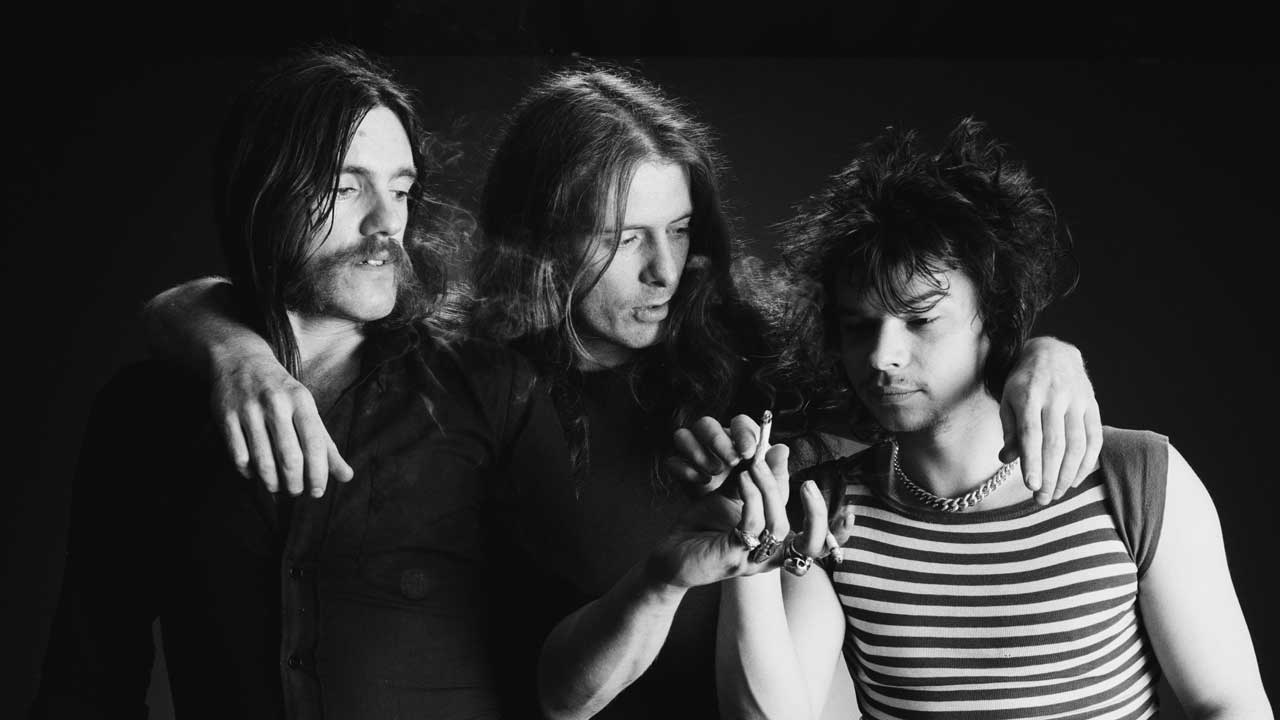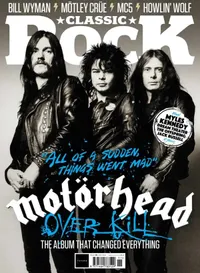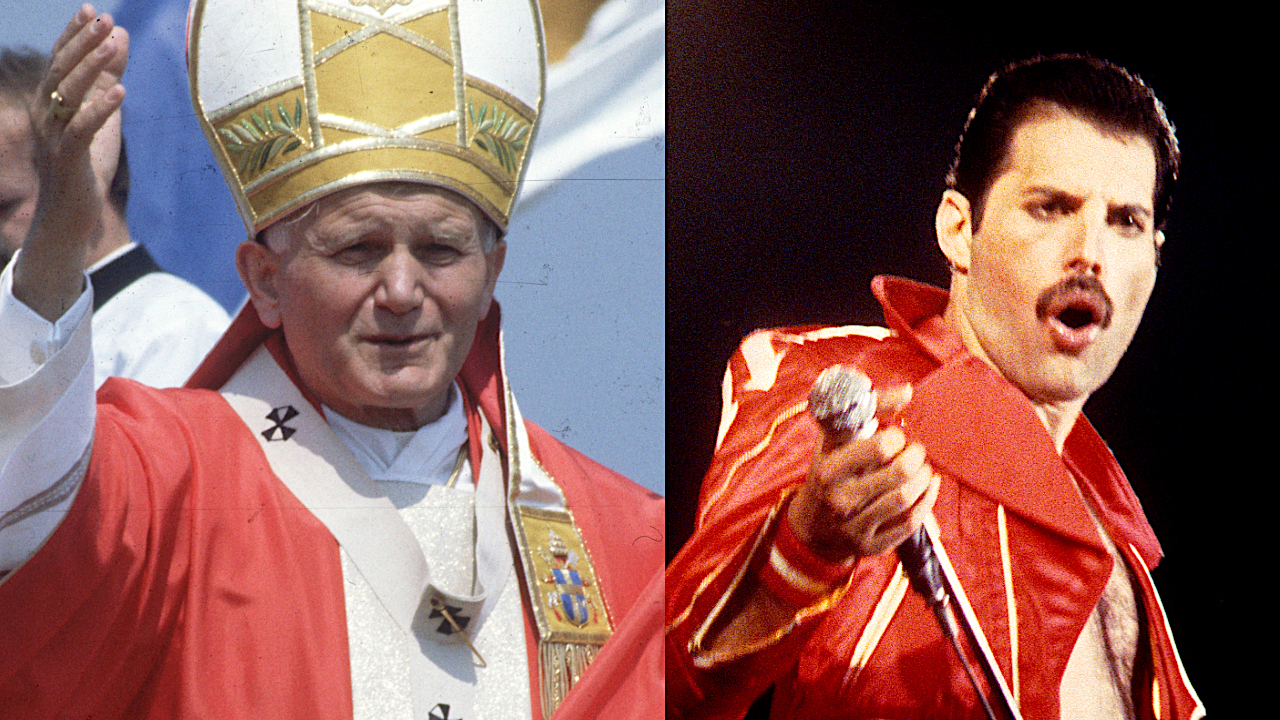"Phil started going mental cos he's got these two bass drums and he doesn't know what to do with them!" How the delivery of a new drum kit gave Motörhead's Overkill to the world
'Fast' Eddie Clarke: "Once we'd cracked the formula of how to work together on Overkill, that's when we really started to take off"

By November 1978, when they headlined their first show at London’s Hammersmith Odeon, the venue that was to become such part of their mythology, Motörhead were still considered little more than a curio. A self-titled debut album, recorded in just three days in April, had been released in the summer of 1977, but it was a mongrel; Hawkwind-meets-Pink Fairies in a hasty redo of an earlier rustbucket (later released as On Parole).
Only the title track – street slang for ‘speed freak’, itself a redo of an old Hawkwind B-side – made an impression when it was released as a single: NME advised to check for structural damage in your home after playing it, while Sounds declared Lemmy to be “the Lee Marvin of megadeath rock”.
Only after a frankly half-arsed version of Louie Louie got confused for new wave and landed the band on Top Of The Pops, in October ’78, did it suddenly feel like maybe Motörhead had something. So began a four-year period in which virtually everything Lemmy and Motörhead touched turned to gold – or at the very least, silver.
“Lemmy was still finding his feet as a lyricist,” guitarist ‘Fast’ Eddie Clarke told me. “My job was giving Lemmy something to sing over.” The trick was: “You’re bombing along having a fucking ball, then you put a couple of little changes in and the next thing you’ve got a song.”
Drummer Phil ‘Philthy Animal’ Taylor was always credited as an equal co-writer because, said Eddie, “We knew if we did make it we didn’t want Lemmy and I coming to work in Rolls-Royces and Phil on a pushbike.”
Yet it was Phil, a former speed-dealer skinhead from Leeds, who came up with the landmark musical motif that turned Motörhead from a punk-metal mutant into something far more transcendent. They were rehearsing in London’s Notting Hill Gate. Phil had just taken possession of a new drum kit fitted with, unusually for the times, double kick drums.
According to Eddie: “Phil goes: ‘Why can’t we do a song like this?’ and starts going mental cos he’s got these two bass drums and he doesn’t know what to fucking do with them! Lemmy goes: ‘All right then’, starts playing in E, as he usually did, and I jumped in. Ten minutes later we had Overkill. We were all grinning, going: ‘Yeah, that was a bit of all right. Let’s do it again…’”
Sign up below to get the latest from Classic Rock, plus exclusive special offers, direct to your inbox!
Lemmy’s lyrics reflected the sheer exuberance of the track: ‘On your feet you feel the beat, it goes straight to your spine/ Shake your head, you must be dead if it don’t make you fly!’
The band were so delighted with Overkill they made it the title track of their second album. Former Rolling Stones producer Jimmy Miller recorded everything ‘hot’ at Roundhouse studios in north London, and the Overkill single and album were released two weeks apart in late February/early March 1979.
Boosted by a 20-date UK tour, Overkill became the first Motörhead album to go Top 30 in the UK, reaching No.24, and the single gave them their first Top 40 hit. There was another Top Of The Pops appearance to go with it, followed by the front cover of Sounds, and a half-hour live broadcast on Radio 1 in May.
The day after that they played their first-ever show abroad, in front of a curious and mostly stunned audience in France at the Palace d’hiver in Lyons.
“Once we’d cracked the little formula of how to really work together on Overkill,” said Eddie, “that’s when we really started to take off.”
As Phil once said: “You hear a lot of good things and a lot of bad things about Lemmy, and most of them are true. He is a c**t, he is a bastard, he does knock off other people’s chicks. But he’s also incredibly funny. Every time you go out with him it’s a memorable experience.”
Or as Eddie put it: “Me and Phil were especially close because Lemmy was a bit of a loner. It never really entered my mind whether I even liked Lemmy or not, but when we played together we felt indestructible.”
It was the Philthy Phil’s “mental” drums, though, that would leave the most lasting impression. Metallica drummer Lars Ulrich was 15 when Phil’s changed his life.
“I got introduced to Motörhead’s music in 1979, when Overkill came out,” he recalled. “I was in a record store, and the double [kick drum] intro to Overkill started, and I’d never heard anything like that in my life.”
According to Lars: “Phil Taylor was the first drummer I ever heard play that double kick drum thing. The first time I first heard Overkill it fucking blew my head off. I could not believe what I was hearing. Of course, then I wanted to play like that too.”
The double kick drum would become the magic ingredient that gave the coming generation of thrash and speed-metal bands their relentless intensity. For his part, Taylor remained blissfully unaware of the revolution he had helped create, telling me that when Metallica supported Motörhead on an early tour, he barely understood what was going on “they played so damn fast”.
Initially, Lemmy yelled at him: “Fucking hell! Can’t you play a straight four?!”
But then Lemmy’s bass was so one-dimensional. He dispensed with the brontosaurus bass of conventional 70s rock – “there was no bottom end at all,” he told me proudly – and replaced it with bass-as-fixed-bayonet. Or as Lemmy cheerfully put it to me one night while holding a large silver dagger smothered in white powder: “Don’t fix what ain’t fixed.”
Hence the broadly similar bass in their all-time number-one anthem Ace Of Spades, and their all-time number two, Overkill. It was those double kick drums on Overkill, however, that set the template.
Cover story: In an exclusive extract from his Fast Eddie biography, Kris Needs looks back at the making of their game-changing Overkill album and the subsequent killing-it UK tour.
Also in this issue: Jack Russell, Nikki Sixx, The Offspring, Myles Kennedy, Bill Wyman, Tuk Smith, Howlin' Wolf, MC5, The Damned, Steve Howe and more.
Mick Wall is the UK's best-known rock writer, author and TV and radio programme maker, and is the author of numerous critically-acclaimed books, including definitive, bestselling titles on Led Zeppelin (When Giants Walked the Earth), Metallica (Enter Night), AC/DC (Hell Ain't a Bad Place To Be), Black Sabbath (Symptom of the Universe), Lou Reed, The Doors (Love Becomes a Funeral Pyre), Guns N' Roses and Lemmy. He lives in England.



